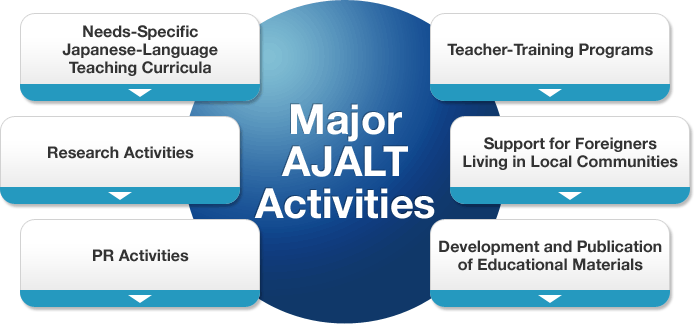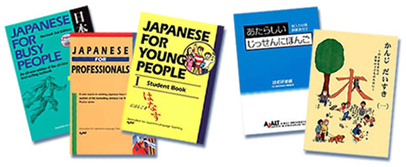AJALT’s activities are all geared toward the realization of a society that is able to use the Japanese language as a medium for promoting mutual understanding among people of diverse cultures and customs.

Needs-Specific Japanese-Language Teaching Curricula
We analyze the particular needs of individual students, and promote the planning and implementation of Japanese-language teaching curricula in both private and group lessons. Our students represent the widest possible spectrum, from business people and diplomats to academics, technical trainees, Indo-Chinese refugees, and children. We also plan and run special Japanese-language programs for groups of foreign nationals hosted by businesses, universities, local authorities, and other domestic and foreign organizations.
1) Our programs are designed to meet the broad-ranging Japanese-language needs of foreign business people, diplomats, and academics. As such, they cover a wide range of proficiency levels, from everyday conversation to the language skills needed to communicate in the workplace and to conduct research. We also offer Japanese-language instruction in specialized areas such as interviewing techniques and sales and marketing.
2) For foreign technical trainees sponsored by businesses, industrial associations, and local authorities, AJALT provides Japanese-language programs to equip students with everyday language skills. These skills include communication with Japanese colleagues and classmates, the recognition of on-site safety warnings, and the development of a specialized vocabulary in their respective field.
3) Since 1980, AJALT has offered Japanese-language courses for Indo-Chinese refugees living in Japan. These courses provide refugees with the language skills they need to settle in Japan, as well as a greater familiarity with Japanese culture and customs.
4) AJALT provides both intensive and supplementary Japanese-language instruction for overseas exchange students, as well as for non-Japanese students attending international schools and regular Japanese elementary, middle, and high schools.
Teacher-Training Program
1) AJALT has held open training seminars for Japanese-language teachers every June since 1985. The seminars tackle themes of particular importance to Japanese-language teaching, and provide systematic programs that cover every aspect of language instruction, from theory to actual teaching methods.
2) The teaching courses focus on various methods used to teach Japanese to particular groups, such as business people, technical trainees, and children.
3) As the number of Japanese-language students continues to grow overseas, the lack of competent teachers is becoming a serious problem. Since 1987, AJALT has been conducting Overseas Teacher Seminars for those involved in teaching Japanese at secondary schools, universities, and private sector institutions in the U.S., Australia, the U.K., Thailand and Singapore. AJALT provides instructors for specialized training courses(sponsored by Japan International Cooperation Agency) for Japanese-language teachers of second-and third- generation Japanese living abroad.
4) With the support of the Japanese-China Skilled-Workers Exchange Center, AJALT also provides curriculum planning and instructors for courses designed to train Japanese-language teachers being sent to China.
5) AJALT also sends instructions to teach at training course for primary-and middle-school Japanese-language instructors. These courses are primarily administered by either the Ministry of Education or the Board of Education.
6) AJALT provides curriculum-planning support and instructors for university major and sub-major courses in Japanese education, course run by the Japan International Training Cooperation Organization, and other public-sector training course.
7) AJALT holds basic training and regular training seminars for Japanese language teachers who are members of AJALT and continually work to improve their teaching skills.
Research Activities
AJALT conducts research into the divers needs of non-Japanese residents, including business people and their families, foreign students, foreign spouses and dependents, and Indo-Chinese refugees. AJALT also conducts research on the state of Japanese-language training support, and monitors the awareness of the Japanese community with regard to these and related matters. AJALT member teachers are active in research related to Japanese-language instruction. Such research includes study of the language itself, as well as specific teaching methods, and research results are published in academic and specialist journals. These results are also presented at seminars and symposia, both in Japan and abroad.
Support for Foreigners Living in Local Communities
1) AJALT provides curriculum planning and instructors for teacher-training courses run by local authorities and international exchange groups.
2) AJALT also provides curriculum planning support and instructors for volunteer Japanese-language-instructor courses run by local authorities.
3) In order to support the internationalization of local communities. AJALT helps plan cultural-exchange programs and courses on international awareness, and sends AJALT instructors to participate in these courses.
4) AJALT offers planning assistance, as well as actual aid and follow-up support, in establishing Japanese-language classes in local communities, and assists foreign nationals in their study of Japanese.
5) At the request of the Agency for Cultural Affairs, local authorities, and various international exchange organizations, AJALT has been involved in creating a network of Japanese-language teachers to support foreign nationals studying Japanese in local communities.
6) We are also conducting research into the development of educational materials for use in the teaching of Japanese in local communities.
PR Activities
1) Once a year, AJALT publishes the magazine AJALT as a means of providing information to all those who are interested in the Japanese language or Japanese-language instruction. AJALT is also intended to increase general awareness of issues related to the teaching of Japanese, and the conditions faced by foreigners in Japan. Ultimately, we hope AJALT contributes to cultural exchange and mutual understanding between Japanese and non-Japanese.
2) Information on Japanese-language teaching in Japan and abroad, as well as international cultural exchange activities, is posted on AJALT’s homepage on the Internet.
3) The annual AJALT Cultural Day is held to introduce Japan’s traditional and modern arts to AJALT students, as well as to establish relationships with AJALT members and staff.
4) By contributing to various periodicals, we work to increase the general public’s awareness of the Japanese language and Japanese-language instruction, and to contribute to the advancement of cultural exchange.
5) AJALT participates and lends support to the lectures, symposia, and other international cultural exchange activities of other organizations.
6) AJALT publishes newsletters that explain its work and activities and helps to promote networking among its members.
Development and Publication of Educational Materials
In order to meet and satisfy the needs of various students, we have been developing and publishing the following Japanese education materials.
Japanese for Busy People series
Practical Japanese- for Technical Trainees-
Reading Japanese Financial Newspapers
Japanese for Professional
Japanese for Young People series
We are also developing “Kanji” studying material for specific fields and various studying aids for local communities.

